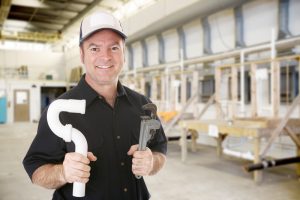 Homeowners throughout our service area know that they can turn to us to find and fix plumbing leaks in their homes. Unfortunately, some homeowners are not aware of the fact that many plumbing leaks can sneak past their defenses, doing a lot of damage to their properties before the homeowners in question even realize that there are problems, to begin with. This is the case with that most nefarious type of leak: the slab leak!
Homeowners throughout our service area know that they can turn to us to find and fix plumbing leaks in their homes. Unfortunately, some homeowners are not aware of the fact that many plumbing leaks can sneak past their defenses, doing a lot of damage to their properties before the homeowners in question even realize that there are problems, to begin with. This is the case with that most nefarious type of leak: the slab leak!
When you have a slab leak in Clearwater, FL, it is vital that you get in touch with a plumber in Clearwater, FL as soon as possible. Before doing so, of course, you need to recognize that you may have a slab leak, to begin with. Today’s blog post is a bit of a primer on the subject of slab leaks—what they are, the challenges that they present, and how we can go about resolving them. So read on, reach out with any questions that you may have, and minimize the risk of damages to your property.
Location, Location, Location
Usually, when you see the phrase above, it’s used in a positive sense. When talking about slab leaks, however, the location is actually a defining characteristic of the problem. Simply put, slab leaks are in a lousy spot to access, and their location makes them notoriously difficult to recognize. That’s because they are leaks that develop beneath the concrete slabs atop which homes are built.
Now, there was a time when a suspected slab leak would necessitate breaking up a bunch of that concrete slab in order to expose the pipes underneath or passing through that slab. Only then could the source of the leak be zeroed-in on. Then, after fixing the leak or replacing the pipe, there’d still be a lot of work to do in repouring that part of the slab. Fortunately, for homeowners today, this is no longer the case.
How We Find Slab Leaks
This is actually going to vary from job to job, but there are a few general approaches that we may take advantage of in order to pinpoint the source of your slab leak. As modern plumbing professionals, we have access to a lot of different tools and systems that simply were not widely available, if even available at all, not that long ago.
These may include thermal imaging systems, which can help us to find hot and cold spots in the concrete that suggest leaks. Sonic listening equipment can also be used to hone in on leak locations simply by the sound of that leak! Gone are the days of swinging the sledgehammer and hoping for the best.
Watch Out for Warning Signs!
The last thing that you want is to give a slab leak the chance to get worse and worse, doing more and more damage to your property in the process. Contact us if:
- You hear the sound of running water when there is none in use.
- You feel hot spots beneath your feet.
- You see signs of water damage along the base of walls.
- You see water bills creeping up without a corresponding increase in usage.
- You find your water heater is unable to keep up with normal demand.
Does every one of these warning signs mean that you have a slab leak? No, but it is one of the possibilities. And regardless of the problem, it should always be resolved promptly.
